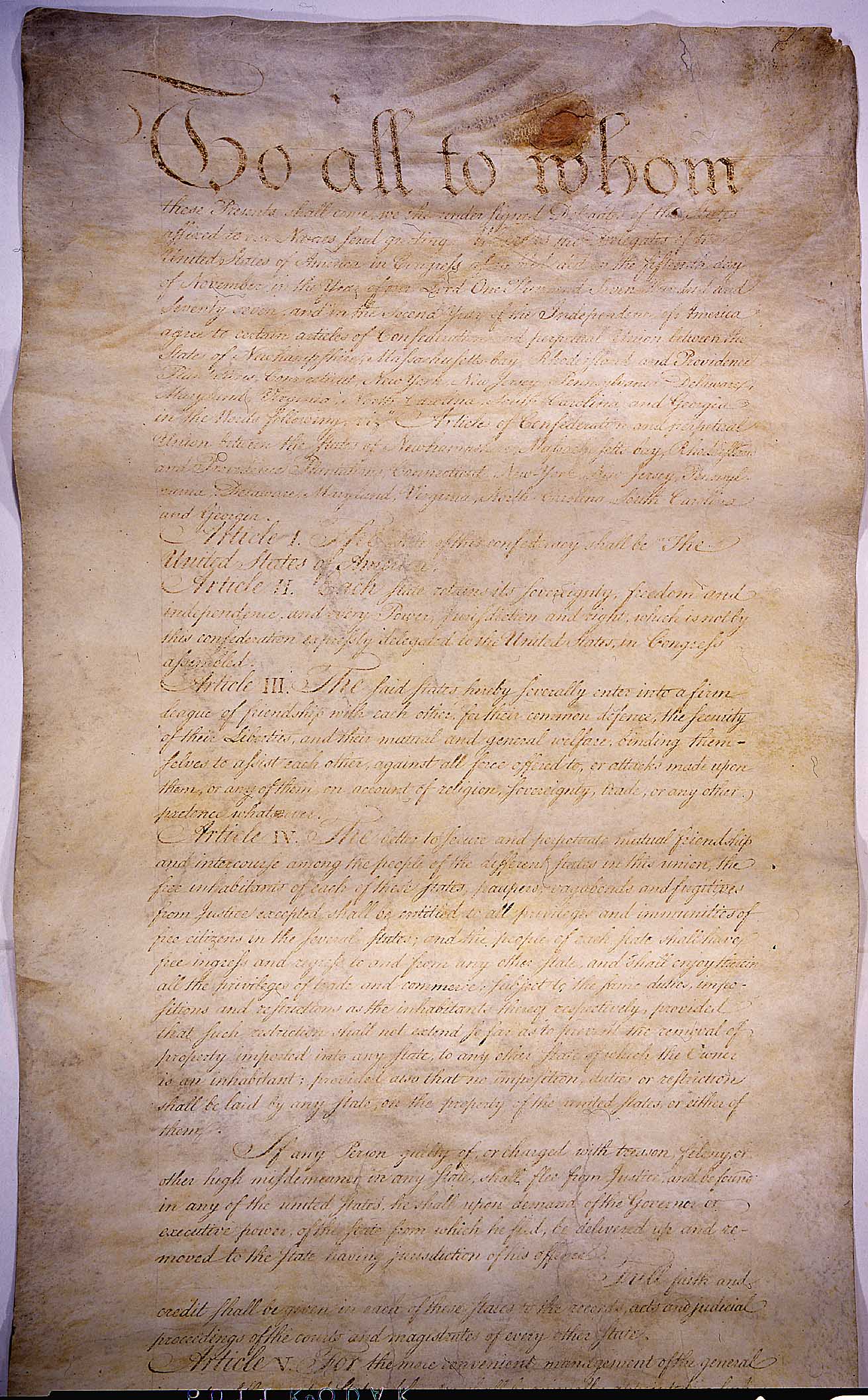Article summaries
The Articles of Confederation contain a preamble, thirteen articles, a conclusion, and a signatory section. The preamble declares that the states “agree to certain articles of Confederation and perpetual Union.” What follows here summarizes the purpose and content of each of the thirteen articles.
- Establishes the name of the confederation with these words: “The stile of this confederacy shall be ‘The United States of America.'”
- Asserts the sovereignty of each state, except for the specific powers delegated to the confederation government: “Each state retains its sovereignty, freedom, and independence, and every power, jurisdiction, and right, which is not by this Confederation expressly delegated.”
- Declares the purpose of the confederation: “The said States hereby severally enter into a firm league of friendship with each other, for their common defense, the security of their liberties, and their mutual and general welfare, binding themselves to assist each other, against all force offered to, or attacks made upon them, or any of them, on account of religion, sovereignty, trade, or any other pretense whatever.”
- Elaborates upon the intent “to secure and perpetuate mutual friendship and intercourse among the people of the different States in this union,” and to establish equal treatment andfreedom of movement for the free inhabitants of each state to pass unhindered between the states, excluding “paupers, vagabonds, and fugitives from justice.” All these people are entitled to equal rights established by the state into which he travels. If a crime is committed in one state and the perpetrator flees to another state, he will be extradited to and tried in the state in which the crime was committed.
- Allocates one vote in the Congress of the Confederation (the “United States in Congress Assembled”) to each state, which is entitled to a delegation of between two and seven members. Members of Congress are to be appointed by state legislatures. No congressman may serve more than three out of any six years.
- Only the central government may declare war, or conduct foreign political or commercial relations. No state or official may accept foreign gifts or titles, and granting any title of nobility is forbidden to all. No states may form any sub-national groups. No state may tax or interfere with treaty stipulations already proposed. No state may wage war without permission of Congress, unless invaded or under imminent attack on the frontier; no state may maintain a peacetime standing army or navy, unless infested by pirates, but every State is required to keep ready, a well-trained, disciplined, and equipped militia, with sufficient public stores of field pieces, tents, arms, ammunition and camp equipage.
- Whenever an army is raised for common defense, the state legislatures shall assign military ranks of colonel and below.
- Expenditures by the United States of America will be paid with funds raised by state legislatures, and apportioned to the states in proportion to the real property values of each.
- Grants to the United States in Congress assembled the sole and exclusive right and power to determine peace and war; to exchange ambassadors; to enter into treaties and alliances, with some provisos; to establish rules for deciding all cases of captures or prizes on land or water; to grant letters of marque and reprisal (documents authorizing privateers) in times of peace; to appoint courts for the trial of pirates and crimes committed on the high seas; to establish courts for appeals in all cases of captures, but no member of Congress may be appointed a judge; to set weights and measures (including coins), and for Congress to serve as a final court for disputes between states.
- “The Committee of the States, or any nine of them, shall be authorized to execute, in the recess of Congress, such of the powers of Congress as the United States in Congress assembled, by the consent of the nine States, shall from time to time think expedient to vest them with; provided that no power be delegated to the said Committee, for the exercise of which, by the Articles of Confederation, the voice of nine States in the Congress of the United States assembled be requisite.”
- If “Canada” (as the British-held Province of Quebec was also known) accedes to this confederation, it will be admitted.[16]
- Reaffirms that the Confederation accepts war debt incurred by Congress before the existence of the Articles.
- Declares that the Articles shall be perpetual, and may be altered only with the approval of Congress and the ratification of all the state legislatures.



